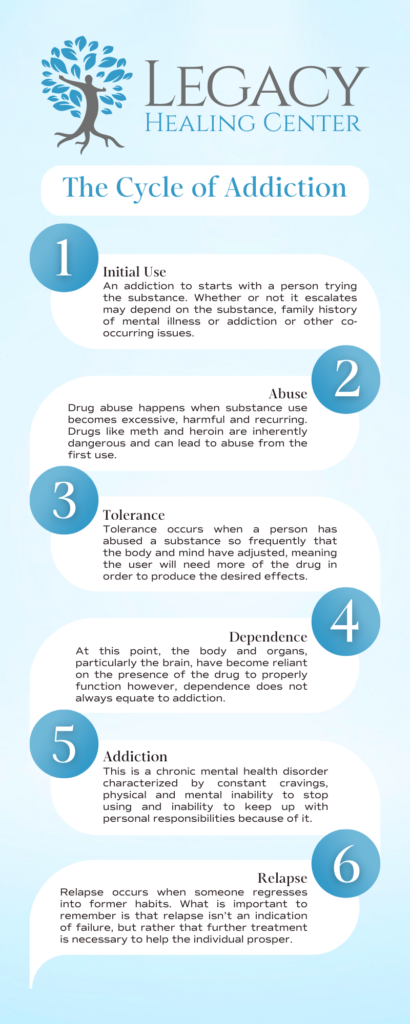
Breaking Down the Cycle of Addiction
Legacy Healing Center Blog
 Addiction is a debilitating disease that has the potential to chemically alter a person’s neurological reward system. It can harm a person physically, emotionally, mentally, and financially. Being a chronic illness, it does not happen all at once. Rather, a person is likely to develop their habit over time, often without even realizing what is happening before it is too late. To help those at risk, Legacy Healing Center is going over the cycle of addiction and what each of these stages may look like.
Addiction is a debilitating disease that has the potential to chemically alter a person’s neurological reward system. It can harm a person physically, emotionally, mentally, and financially. Being a chronic illness, it does not happen all at once. Rather, a person is likely to develop their habit over time, often without even realizing what is happening before it is too late. To help those at risk, Legacy Healing Center is going over the cycle of addiction and what each of these stages may look like.
What is the Cycle of Addiction?
This refers to the unique stages that a person at-risk will experience as their addiction develops over time. Each stage presents its own problems and challenges to the person experiencing it, and if not properly addressed, can quickly escalate into a full-blown substance use disorder. What’s more, it isn’t just illicit drugs that can cause this. A person can develop an addiction to a drug prescribed by their doctor if they do not use it as directed. No matter the case, it is crucial to be able to identify an addiction cycle that a person may be experiencing in order to get them the help that they need.
The Stages of Addiction
There are 6 stages in the cycle of addiction. No matter the stage that a person finds themselves in, it is important that they practice caution. If they do find themselves struggling to break away from substance abuse because of issues like withdrawals, they are advised to seek out the management of these symptoms with the Legacy Healing detox center.
- Initial Use – As the name would suggest, for an addiction to start, a person needs to try the substance. The circumstances surrounding this can be as socially accepted as trying a drink on someone’s 21st birthday, or as dangerous as being peer pressured by friends to try a drug. Whether or not it escalates may depend on the substance, family history of mental illness or addiction, or other co-occurring issues.
- Abuse – This is when the use becomes excessive, often on a recurring basis. Substance use can fall into the bracket of abuse whenever it becomes harmful or dangerous. An example of this could be taking a higher dose of medication than was prescribed by a doctor, or participating in regular drug or alcohol binges. Still, abuse of drugs like meth and heroin occurs from the first time a person tries it because those substances are inherently dangerous.
- Tolerance – This stage occurs when a person has abused a substance so frequently, that the body and mind have adjusted. This means that the user will need more of their drug of choice in order to produce the desired effects. Tolerance is a major indicator that a chemical change has occurred as a result of substance abuse.
- Dependence – At this point, the body and organs, particularly the brain, have become reliant on the presence of the drug to properly function. For example, a person who has abused cocaine for a prolonged period of time may find themselves unable to experience feelings of pleasure without it. Another factor worth considering is that dependence does not always equate to addiction.
- Addiction – This is a chronic mental health disorder that is hallmarked by a number of factors. These factors include constantly craving the substance in question, being physically and mentally unable to stop using it, and being unable to keep up with personal responsibilities because of it.
- Relapse – Many say that recovery is a lifelong process, meaning that it requires daily consideration and effort to maintain. This also means that the potential of relapse is always present, which occurs when someone regresses into former habits. What is important to remember is that relapse isn’t an indication of failure, but rather that further treatment is necessary to help the individual prosper.
Breaking the Cycle of Addiction with Legacy Healing
For those interested in getting the help that they need, Legacy offers options for addiction treatment for a variety of substance use disorders. Our curriculum of care levels will also ensure that each patient is getting the most appropriate care for their specific needs.
For more information on the programs and therapies available at our facility, call us today at 888-534-2295 and speak with an intake specialist today.
